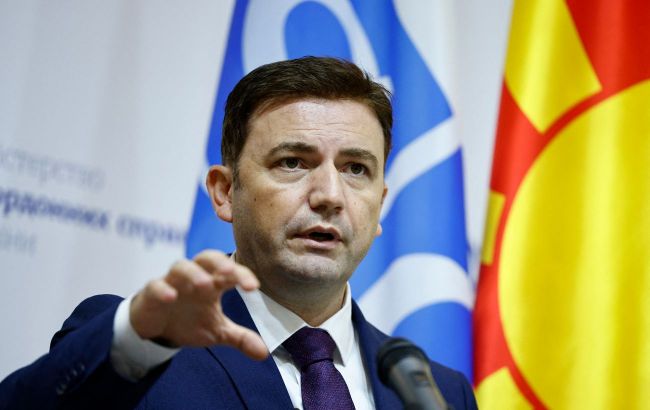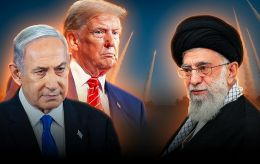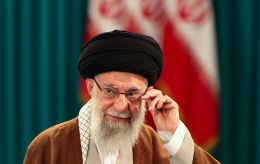'Lavrov's place is at a special tribunal'. Key points on OSCE meeting and Ukraine's diplomatic standoff
 OSCE Chairman Bujar Osmani gathers European ministers for a meeting in North Macedonia (twitter.com/Bujar_O)
OSCE Chairman Bujar Osmani gathers European ministers for a meeting in North Macedonia (twitter.com/Bujar_O)
North Macedonia is preparing to hold a meeting of the Ministerial Council of the Organization for Security and Co-operation in Europe (OSCE). The event is already accompanied by a scandal as Ukraine and several other countries have refused to participate in the meeting.
For more details about the meeting, reasons for the boycott, and which countries supported Ukraine, read the story by RBC-Ukraine.
To prepare the article the following sources were used: the OSCE website, statements from European officials, Russian Foreign Minister Sergey Lavrov, and the Ukrainian Ministry of Foreign Affairs.
Meeting of OSCE ministers: dates and topics
The thirtieth meeting of the OSCE Ministerial Council will take place in Skopje (the capital of North Macedonia) on November 30 - December 1. The session will be held at the invitation of the current OSCE Chairperson and the head of the North Macedonian Ministry of Foreign Affairs, Bujar Osmani, at the Boris Trajkovski Sports Center.
One of the topics will be the Russia-Ukraine war. In October, Osmani visited Kyiv and considered Ukraine as his priority since the future of Europe is being decided here.
"When the very core of the organization (OSCE) is under threat, one needs to focus on this. And this is happening right now. Russian aggression against Ukraine is undermining the foundations of the international order," he said.
During his first visit to Kyiv as the OSCE Chairperson in January 2023, Osmani stated that the Russian Federation must immediately stop the war and withdraw its troops from the territory of Ukraine.
Invitations to the meeting in Skopje were extended to the foreign ministers of all 57 OSCE participating states. However, Ukraine and several other countries announced a boycott because of the participation of Russian Foreign Minister Sergey Lavrov.
Lavrov attends the OSCE Ministerial Council for the first time since the beginning of the war
For the first time since the start of the full-scale invasion of Ukraine, Russian Foreign Minister Sergey Lavrov will attend the OSCE Ministerial Council meeting. Recently, he mentioned a condition - if Bulgaria opens its airspace for a Russian government plane. Since February 26, 2022, Bulgaria, as a member of the European Union, closed its airspace to Russian airlines because of the escalation of the war and in solidarity with Ukraine.
"Supposedly, Macedonia invited us to the OSCE Ministerial Council. Supposedly, Bulgaria promised Macedonia to open its airspace. If it works out, we'll be there," Lavrov said.
According to him, the Russian side supposedly received several requests for bilateral meetings from Western representatives. Lavrov promised to meet with everyone. Yesterday, the Bulgarian Ministry of Foreign Affairs confirmed the permission.
"Bulgaria has given permission for the special aviation unit 'Russia' to fly over the airspace of the Republic of Bulgaria to carry out a flight to transport the delegation to participate in the international forum," the Ministry of Foreign Affairs stated.
The diplomatic permit is temporary and will be valid for 3 hours before and 72 hours after the scheduled date and time of the flight. The pass is granted for participation in the meeting in Skopje and falls under the exception of the EU sanctions regime against Lavrov.
However, the permit does not extend to other members of the Russian delegation who are subject to sanctions. Presumably, this refers to the media. Maria Zakharova, the official representative of the Russian Ministry of Foreign Affairs, complained that several journalists were not allowed to cover the OSCE Ministerial Council. Moreover, according to her, "some countries of the collective West" allegedly try to hinder the participation of the Russian delegation.
Ukraine boycotts the meeting: reasons and arguments
Ukraine expressed gratitude to North Macedonia and personally to Bujar Osmani, who in 2023 demonstrated commitment to defending the principles of the OSCE. However, Ukrainian Foreign Minister Dmytro Kuleba will not attend the meeting in Skopje due to Lavrov's participation.
The statement from the Ukrainian Ministry of Foreign Affairs says that Moscow consistently undermines the OSCE by abusing the consensus rule, including blocking Estonia's candidacy for chairmanship in 2024. Additionally, Russia has unlawfully detained three Ukrainian representatives of the OSCE for over 500 days.
"In such circumstances, the presence of the Russian delegation at the ministerial meeting at the ministerial level for the first time since the beginning of Russia's full-scale invasion of Ukraine will only worsen the crisis into which Russia has driven the OSCE," the Ministry of Foreign Affairs noted.
The Ukrainian side calls for efforts to rescue the OSCE from Russia rather than sending a signal to the aggressor about a return to the forms of interaction that existed before February 2022. Despite the boycott, Ukraine remains committed to the principles of the OSCE and is ready to work with partners to restore respect for the Helsinki Final Act based on President Volodymyr Zelenskyy's Peace Formula.
The Helsinki Final Act is a document that, among other things, outlines the political and territorial outcomes of World War II and sets forth principles for the relations between countries, including the principles of the inviolability of borders and territorial integrity.
What countries supported Ukrainian demarche
Support for the Ukrainian stance was expressed by the Baltic countries – the foreign ministers of Lithuania, Latvia, and Estonia also decided not to participate in the meeting in Skopje.
"Over the past two years, we have witnessed how one OSCE participating state actively and cruelly tried to destroy another. Let's be crystal clear: Russia's aggressive war and atrocities against its sovereign and peaceful neighbor Ukraine grossly violate international law, including the UN Charter, and constitute an attack on the OSCE and its fundamental principles," the joint statement reads.
The Baltic countries condemn Russia's behavior in the OSCE, noting that Moscow first blocked the presence and activities of the OSCE in Ukraine, then blocked Estonia's chairmanship for fabricated reasons, and now obstructs constructive solutions for the organization's work.
"We deeply regret the decision to allow the personal participation of Russian Foreign Minister S. Lavrov in the 30th OSCE Ministerial Council session in Skopje. This will only give Russia another opportunity for propaganda," the statement said.
The presence of Lavrov threatens to legitimize the aggressor country as a legitimate member of the community of free nations and downplays the severity of war crimes. While the necessary unconditional cessation of Russia's aggression, withdrawal of troops from the occupied territories of Ukraine, compensation for damages, and full accountability for those responsible for international crimes are essential.
"The OSCE was established to build European security, prevent conflicts, and preserve peace. Russia, by its illegal and savage actions, has repeatedly proven that it is not a partner of Europe in the security sector. In fact, today Europe needs security from the Russian side and against it, not together. That is why we, the foreign ministers of the Baltic countries, have decided not to be present at the OSCE Ministerial Council meeting in Skopje," noted the heads of the foreign ministries of Lithuania, Latvia, and Estonia.
Estonian Minister Margus Tsakhna criticized Lavrov's invitation to the meeting of foreign ministers of NATO countries in Brussels.
"Lavrov's place is at a special tribunal, not at the OSCE table," he said, adding that during the meeting in Skopje, the Russian military machine will continue to kill innocent Ukrainians and deport children without batting an eye.
Blinken and Borrell are going to the meeting. They will not talk to Lavrov
Joseph Borrell, the EU's High Representative for Foreign Affairs, stated that he would attend the meeting in Skopje because the EU must be represented at a high level.
"We have to go, we are a member of this organization. We have to present our views and counter the views of Russia," said the head of EU diplomacy.
He emphasized that he would not have the opportunity to talk with Lavrov, as he had to return promptly to the meeting of the European Defense Agency.
"But I don't want the seat of EU to be empty... Russia will present its point of view, and we, Europeans, will have to present ours. But I will not have a direct discussion with Lavrov," he explained.
U.S. Secretary of State Antony Blinken will also attend the meeting. Responding to questions about the possible meeting with Lavrov, a State Department representative said, "We do not expect this."
"We respect the right of each country to decide whether to participate or not. We believe that this is a useful forum for interacting with OSCE members, so we plan to attend," he commented on Ukraine's and the Baltic countries' boycott.
The American official adds that the OSCE is a really important institution for solving political and human rights issues. Therefore, Blinken intends to express solidarity with other participating countries.
How Russia obstructs the work of the OSCE
One of the topics of the Skopje meeting will also be the election of a new OSCE chairperson. As expected, Estonia was to take over this position in 2024, but Russia and Belarus vetoed this decision. As decisions are made by consensus, Estonia will be unable to lead the organization.
Estonia was the only candidate from the European Union. It expressed its desire to chair the OSCE as early as 2020, but Moscow immediately opposed it. Tensions increased after Russia's full-scale invasion of Ukraine. In particular, Russia's OSCE Permanent Representative Alexander Lukashevich referred to Estonia as a "hostile state" that would not consider Russian interests.
After the invasion, Russia blocked a series of OSCE decisions. After its delegation was not allowed to attend sessions in Poland and the UK, it refused to pay membership fees. Consequently, the organization is seeking ways to preserve its ability to function fully. In May 2023, the then-Finnish Minister for Foreign Affairs Pekka Haavisto stated that if a chairperson were not elected, the OSCE might cease to exist.
According to the plan, Finland is to head the OSCE in 2025. Malta may chair it in 2024, as it has already received an offer due to Estonia's election issues. Russia has already blocked Malta's election at one of the meetings in Vienna, but probably to pressure and organize Sergei Lavrov's visit.
Malta is perceived as a compromise option because it declares neutrality. But it condemned Russia's aggression against Ukraine and joined sanctions as an EU member. Recently, the Permanent Council of the OSCE recommended officially approving Malta as the chairman. According to Bujar Osmani, the consensus on this issue needs to be confirmed at the Council of Ministers in Skopje.

